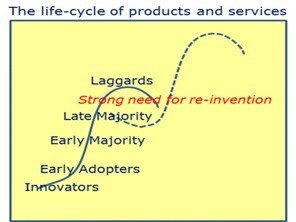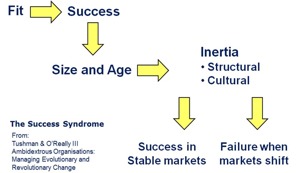SUCCESS IS A SLEEPING PILL
One of the most common dysfunctions of a team (or a whole organization) is the ‘success syndrome’, the ignorance of changing market conditions. See the picture to the right. [1]
[1] Tushman & O’Really III, Ambidextrous Organisations: Managing Evolutionary and Revolutionary Change
Organisations that have found their recipe for success, incorporate their uniqueness in the business formula, build up specialised skills and competencies and develop efficient processes for the delivery of their products and services.
This often separates the ‘ordinary production process’ from strategic reorientation.
When the organisation has been successful over a long time period, the leaders of the organisation stare themselves blind on this success and unlearn to be attentive to changes in the environment.
The psychological causes of this phenomenon are well explained in the book ‘Always change a winning team’ by Peter Robertson[2]:
In all living mechanisms, including human beings, organisations and communities, the S-curve is a leading pattern: birth, renewal growth, decadence and decline.
[2] Peter P. Robertson, 2005, Always Change a Winning Team, Why reinvention and change are prerequisites for Business Success
‘Success is a sleeping pill’ says Peter Robertson, the author of ‘Always change a winning team’. At the end of the lifecycle, when the need for re-invention is at its strongest, the innovative power of the management seems often completely absent.
At the end of the life-cycle of successful growth, when ‘new-think’ is an absolute necessity, the act of re-invention is often completely absent.






